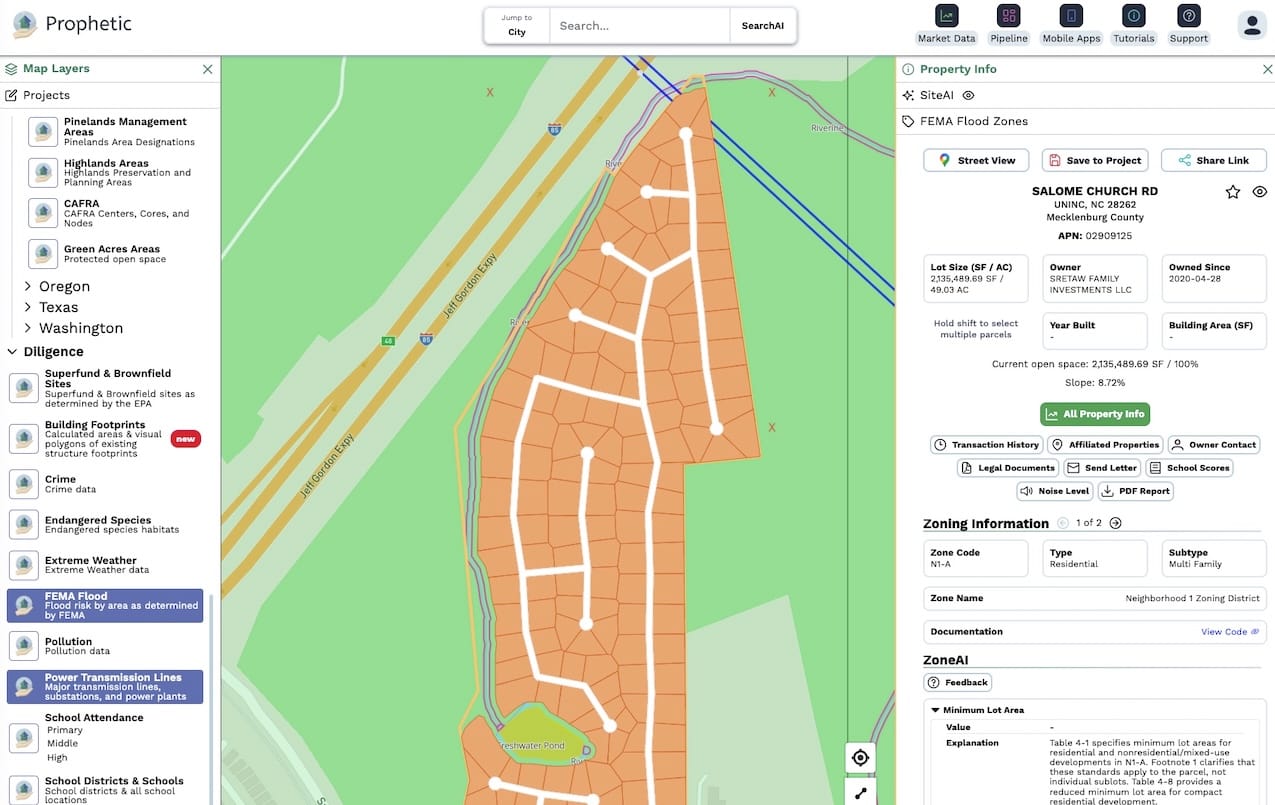Land
D.R. Horton Bets Big On AI-powered Land Technology
America’s largest homebuilder has gone all-in on AI. D.R. Horton’s multi-year partnership with Prophetic signals a turning point for technology adoption in land acquisition—and a warning to competitors still operating in manual mode.

Prophetic, an AI-driven platform that automates the initial land discovery and analysis process for homebuilders and developers, just announced an organization-wide partnership with D.R. Horton.
Oliver Alexander, Founder & CEO at Prophetic, tells The Builder’s Daily that the platform will be rolled out across all of D.R. Horton, Forestar, and DHI engineering in a blanket enterprise, multi-year agreement. Prophetic has already started deploying its technology to certain divisions and will work its way through a ranked list one by one until the process is complete.
The partnership with America’s largest homebuilder by volume is not only a business milestone for Prophetic – it also reflects a larger trend of homebuilders increasingly leveraging AI and technology to increase operational efficiency.
Homebuilding firms that intelligently deploy the latest technology could gain competitive advantages at a time when margins are thin, homebuyer demand is sluggish, and operational efficiency is a major differentiator.
We're just completely humbled by it,” Alexander says of the partnership with D.R. Horton. “But also it just goes to show there's a lot of appetite for modern AI-driven technology in the homebuilding space.”
How Prophetic Works
Prophetic partners with anyone from large public homebuilders all the way down to two-person land acquisition shops. The company currently has data for 25 states, and expects to expand into all 50 states by June of next year. The platform doesn’t do any financial due diligence yet, but it could move into this area in future years as well.
Before we actually started building the product, I spent a year and a half researching and interviewing homebuilders, developers, architects, and engineers full-time. It was a very deep process, and what came from that is a very precise understanding of exactly what they need for this to be a success,” Alexander explains.
The platform automates much of the initial land acquisition and analysis process, enabling team members to complete a series of tasks in just two minutes that would otherwise take hours when done manually.
There are five main components.
Zone AI: This tool is Prophetic’s foundational piece. It combs through every municipality’s zoning materials and pulls out all relevant information needed to evaluate a site’s development potential. This information could include minimum lot size, required setbacks, max coverage, open space requirements, and other metrics.
Prophetic’s platform references the document, section, and page number from which the data is pulled, so users can verify the information if desired.
Site AI: This feature leverages the zoning data to create a site plan that, in Alexander’s words, is about 85% of what a civil engineer can do. The site plan doesn’t replace the need for an engineer, but it provides a visual of what can be built on a piece of land within seconds.
Search AI: This feature allows users to search for parcels by development intent and criteria across different municipalities and states.
DevMap: This tool displays all subdivisions, entitled projects, and active developments across the country, including those undergoing entitlement. This allows users to observe market trends and evaluate opportunities and saturation points.
DealDesk: DealDesk markets itself as a land acquisition CRM that integrates every analysis, relationship, and insight for any parcel into a centralized platform.
The Big Picture
Prophetic helps homebuilders evaluate a site's viability in minutes, rather than hours of manual research.
To illustrate this, Alexander explains that everyone’s first day at Prophetic is the same. Every new team member is given three random addresses across the country and ten questions to answer manually, such as who owns the land or if it is a brownfield site. The average time it takes a new employee, regardless of their level of sophistication, to answer the questions for all three parcels is about 2 hours and 15 minutes. Prophetic accomplishes the same task in six minutes.
What we focus on is not taking a three-year project and making it two years. Instead, because you were able to analyze this stuff so fast and arrive at a yes or a no so fast, you effectively can control your entire market, because your competitors cannot get to a decision before you can,” Alexander said.
The platform also provides owner information for each parcel, and aims to facilitate more off-market deals. Alexander explains that Prophetic can help homebuilders unlock more off-market land-acquisition opportunities by analyzing and identifying far more parcels.
Broader Implications For Homebuilders
In Alexander’s experience, there’s been a noteworthy shift in homebuilding over the last 12 months, an industry that, until recently, viewed AI as an untested, potentially unreliable fad. There’s been far more interest in AI from homebuilders over the last year, and more companies are leveraging it to their advantage.
The technology Prophetic uses is in its early stages of adoption, but it is advancing rapidly.
Even a year ago, we really didn't talk about any of the AI in our platform, because there was negative stigma,” Alexander says. “This is kind of the halo moment. You have all the initial kinks in the tech worked out over the last 5 or 10 years with large language models and AI in general. Yet you don't have mass adoption of it. The tech is very good, but it's just now hitting a viable commercial product.”
Alexander expects AI to have an increasing impact on homebuilding in the future, with its footprint growing exponentially year over year as AI improves.
This isn’t a game of linear efficiency or value. It’s exponential,” he said.
The partnership with D.R. Horton could give Prophetic’s AI platform more credibility. It also signals that this kind of technology could be here to stay. In a press release, Jason Jones, VP Data Analytics, D.R. Horton, notes:
One of the largest challenges to providing affordable housing is the identification, acquisition, and entitlement of land suitable for development. We are confident the insights provided by Prophetic are going to help us expand homeownership opportunities for hard-working American individuals and families.”
In March, D.R. Horton announced another partnership with TraceAir. This technology platform elevates site intel and simplifies construction management for homebuilders through a combination of drone mapping, cloud software, and AI.
D.R. Horton's strategic maneuvering signals AI's growing role in the myriad workflows that make up homebuilding's tech-stack — and that it is the future, not a fad.
Competing homebuilders, whether large public or small private operators, may need to start looking at AI as a necessity, not an option.
MORE IN Land
Land 'Heavy,' Future Ready: Stanley Martin’s $700M Pivot
In an AI-driven land rush, Stanley Martin Homes turned deep zoning and engineering expertise into one of the largest single-use, single-parcel land sales in U.S. history. President Steve Alloy explains why playing “land heavy” still pays off when skill meets timing.
Millrose Q3 Outperforms On Tech, Discipline & Land‑Light Strategy
As many builders pull back, Millrose Properties leverages data‑driven underwriting and select partnerships to bank growth despite a softening market.
Jody Kahn: What Builders Say Now About New Home Demand
Amid slumping buyer urgency and looming policy uncertainty, John Burns Research & Consulting research guru Kahn summarizes builder sentiment trends and pain points from fresh field data.
